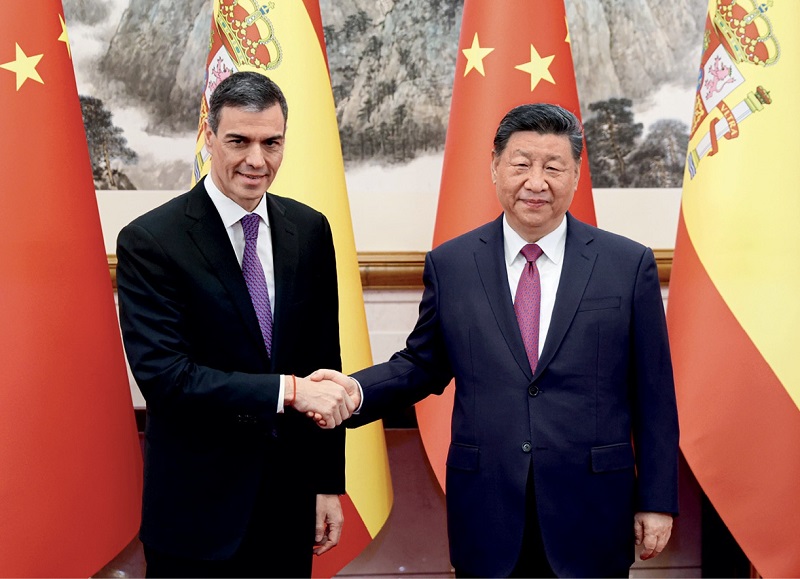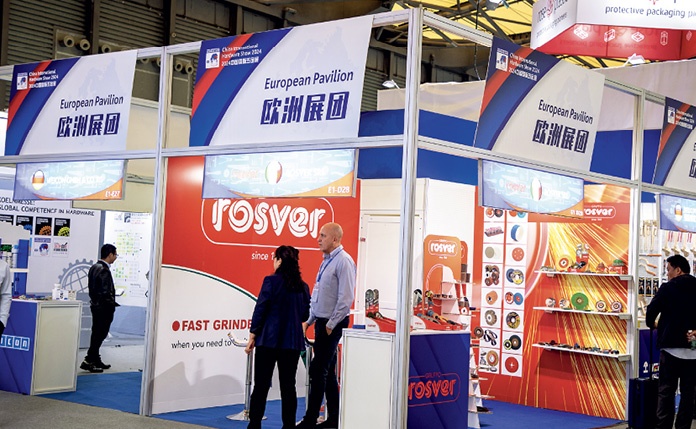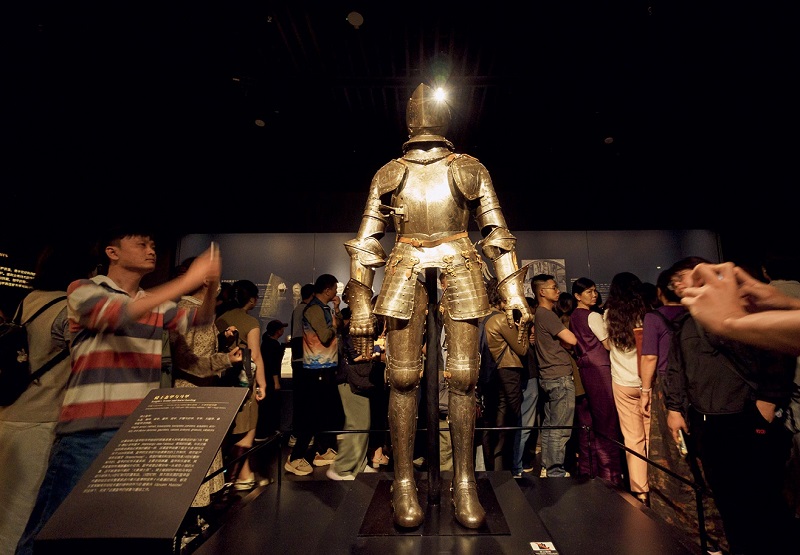Five decades have passed since China and the European Union (EU) established diplomatic relations. In his phone call with António Costa, president of the European Council, on January 14, 2025, Chinese President Xi Jinping pointed out an important feature of China-EU relations: “There exists no clash of fundamental interests or geopolitical conflicts between China and the EU, making them partners that can contribute to each other’s success.”
Reviewing the history of the bilateral ties, Xi said, “The development history of China-EU relations demonstrates that as long as the two sides uphold mutual respect, treat each other as equals, and engage in candid dialogue, they can advance cooperation and accomplish great things.”
In a world where sovereignty is threatened, tariffs are abused, and common values are undermined, China and the EU have even more reasons to strengthen their partnership, economically, culturally, and strategically.

Chinese President Xi Jinping meets with Spanish Prime Minister Pedro Sánchez in Beijing on April 11, 2025.
Economic Cooperation
In March 2014, Xi became the first Chinese president to visit the headquarters of the EU. In a speech delivered at the College of Europe in April 2014, Xi expressed hope to work with Europe to build a bridge of friendship and cooperation across the Eurasian continent, an idea that remains relevant today.
Over the past five decades, economic and trade cooperation between China and the EU has steadily developed, with the trade volume increasing from US $2.4 billion to US $780 billion and investment rising from almost zero to nearly US $260 billion. China and the EU have become each other’s second-largest trading partners.
One stand-out symbol of the closer economic ties is the China-Europe Railway Express. Covering 227 cities in 25 European countries, it had run more than 100,000 cargo trips by the end of 2024, transporting more than 11 million TEUs of goods with the total value exceeding US $420 billion.
“The China-Europe Railway Express not only brought 2.1 million types of goods from the Yiwu market to the world, but also brought back 100,000 types of goods from over 100 countries,” said one official from the Yiwu Market Development Committee.
Xi praised the railway in September 2023, saying, “China-Europe Railway Express has built a new platform for economic and trade cooperation along the route, effectively guaranteed the stability of the global industrial chain and supply chain, and injected new impetus into the development of the world economy.”
However, recent trade tensions have tested this momentum. In October 2024, the European Commission announced that it passed a vote to impose punitive tariffs on Chinese battery electric vehicles (EVs). The move sparked debate within the EU, with some leaders warning against escalating trade frictions.
When meeting with Charles Michel, then president of the European Council, and Ursula von der Leyen, president of the European Commission, in December 2023, Xi called for a constructive approach to disagreements. “We should develop the correct perception of each other, promote mutual understanding and trust, honor commitments, do the right thing, and be wholehearted in developing China-EU relations,” he said.
“We should not view each other as rivals just because our systems are different, reduce cooperation because competition exists, or engage in confrontation because there are disagreements,” Xi said.
Xi reiterated this point when he attended the China-France-EU Trilateral Leaders’ Meeting in May 2024. Acknowledging that the two sides have extensive common interests and broad space for cooperation in green and digital transition, he said that it is necessary to properly address economic and trade frictions through dialogue and consultation and accommodate each other’s legitimate concerns.
Encouragingly, both sides have recently agreed to promptly resume their negotiations on a price commitment plan regarding the anti-subsidy probe into Chinese EVs. Ursula von der Leyen’s message to expand trade and investment ties with China earlier this year signals a shift toward pragmatism and dialogue.
During the phone call with Antonio Costa, Xi concluded that the economic and trade cooperation between China and the EU is mutually complementary and beneficial, with both sides serving as defenders of the multilateral trading system, while noting that the two sides have already formed a strong economic symbiotic relationship. In a global economy facing uncertainty, preserving and enhancing this relationship is not just a diplomatic priority for the two sides – it’s a shared strategic necessity.

The European Pavilion of the 2024 China International Hardware Show in Shanghai on October 22, 2024.
Cultural Exchanges
From the ancient Silk Road to the journeys of Marco Polo, from Chinoiserie in the 17th and 18th centuries to the scholarly exchanges of Western missionaries like Matteo Ricci, China and Europe have long enriched each other through cultural exchanges. As two major civilizations in the world, their histories have been deeply interwoven.
Based on this tradition, Xi has repeatedly emphasized the importance of cultural exchanges with European countries. For example, in his congratulatory message to Constantine Tassoulas on his inauguration as president of the Hellenic Republic in March 2025, Xi said he is ready to work with Tassoulas to continue the traditional friendship and strengthen the ties of mutually beneficial cooperation and cultural exchanges. Similarly, when holding talks with Italian President Sergio Mattarella in November 2024, Xi said China-Italy cultural cooperation has yielded fruitful results and is full of vitality, urging the two sides to continue to strengthen people-to-people exchanges.
One concrete step toward this goal is China’s visa-free policy for over 20 EU countries, which has made travel and exchanges significantly easier. Ian Borg, deputy prime minister of Malta, in a press release said, “This visa-free agreement reflects the strong mutual trust and commitment to fostering closer ties in tourism, business, and cultural exchange.”
The China-EU High-Level People-to-People Dialogue is one of the three main pillars, along with the China-EU High-Level Strategic Dialogue and the China-EU High-Level Economic and Trade Dialogue, of the China-EU relationship. In March 2024, its sixth meeting was held in Beijing, the first in-person meeting since 2017, during which both sides agreed to promote people-to-people exchanges and practical cooperation.
Cultural events have added vibrancy to this momentum. One example is an exhibition called The Forbidden City and the Palace of Versailles: Exchanges Between China and France in the 17th and 18th Centuries. Held from April to June 2024 in Beijing, the exhibition features about 200 works from the collections of the two museums and other institutions, allowing visitors to learn about the political and cultural relationship between China and France during that period, which is also a reflection of China-EU exchanges.
Another notable cultural event is the hosting of the sixth edition of the China-Europe Talent Forum in October 2024. Themed “Sharing Together, Growing Together, and Winning Together – Bridging Continents: Fostering Future-Fit Talent Development,” the forum attracted more than 240 Chinese and foreign guests to participate in in-depth exchanges and dialogues and promote cooperation between China and Europe in talent cultivation in fields across the board, launching several China-Europe talent exchange projects and releasing research findings.
Seeing the role of cultural exchanges in deepening understanding between Chinese and European peoples, Xi called for continued efforts to enhance cultural exchanges and people-to-people interactions, encourage mutual visits between their people, and support local exchanges and educational cooperation, so as to strengthen the foundation of public support for China-EU friendship.

The exhibition themed “Steel of Glory: A Knight's Life of Armor, Blade and Honor” at the Nanshan Museum in Shenzhen attracts many visitors on March 28, 2025.
Addressing Topical Issues
Beyond economics and culture, China and the EU face a shared responsibility to contribute to global peace and stability. At a time when geopolitical tensions are rising and multilateralism is under strain, their partnership becomes all the more vital.
On the pressing issue of the Ukraine crisis, of deep concern to the EU, China has advocated for dialogue and de-escalation from early on. In March 2022, Xi said in a virtual meeting with leaders of France and Germany, “China maintains that the sovereignty and territorial integrity of all countries must be respected, the purposes and principles of the UN Charter must be fully observed, the legitimate security concerns of all countries must be taken seriously, and all efforts that are conducive to the peaceful settlement of the crisis must be supported.”
In February 2023, "China’s Position on the Political Settlement of the Ukraine Crisis" was released, stating its position on the political settlement of the Ukraine crisis. In September 2024, China and Brazil, along with other Global South countries, launched the group of Friends for Peace on the Ukraine crisis to help foster conditions for the political settlement of the crisis.
While some Western governments have questioned China’s neutrality in the Ukrainian crisis, others have acknowledged the importance of its engagement. Vadim Karasyov, Ukrainian political scientist and director of the Institute of Global Strategies, told CGTN, “China is the second largest power in the world today and China’s position cannot be ignored. China’s initiative has won support from many developing countries.”
The path forward remains complex, but China and the EU both have a stake in building a more stable global order. As Xi pointed out, the more severe and complex the international situation becomes, the more China and the EU should adhere to the original aspirations of establishing diplomatic relations, strengthen strategic communication, enhance strategic mutual trust, and uphold the position of partnership.
Fifty years on, the China-EU relationship is again standing at another crossroads. With economic cooperation, cultural exchanges, and shared global responsibilities tying them together, China and the EU have a unique opportunity to show the world what pragmatic, forward-looking cooperation between civilizations can achieve. 